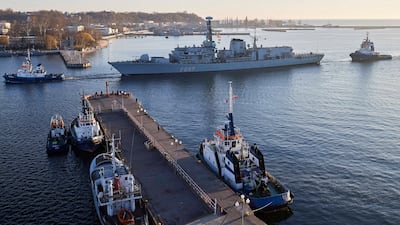In a bid to protect underwater infrastructure following attacks on the Nord Stream pipelines, a Royal Navy frigate has been sent to the North Sea, the Ministry of Defence said on Monday.
At a crisis meeting of northern European nations on Monday, Defence Secretary Ben Wallace discussed co-ordinated security responses, including increased maritime presence.
“The group condemned the blatant attacks against civilian infrastructure,” the ministry said on Twitter.
“A Royal Navy frigate is in the North Sea, working with the Norwegian Navy to reassure those working near the gas pipelines.”
Russia was accused of attacking the Nord Stream undersea gas pipelines, which led to huge methane leaks.
UK Prime Minister Liz Truss has said a series of explosions that caused major damage to the pipelines were “clearly an act of sabotage”.
Before his meeting with counterparts in the joint expeditionary force, Mr Wallace said that Russia makes “no secret” of its ability to affect underwater infrastructure.
Speaking at the Conservative Party conference on Sunday, the defence secretary said “the Nordic states and ourselves are deeply vulnerable to people doing things on our cables and our pipelines”.
The “mysterious” damage inflicted to the Nord Stream pipelines should be a reminder of how “fragile” the UK economy and infrastructure are in the face of “hybrid attacks”, Mr Wallace said.
He said that the government will acquire “two specialist ships” with the capability to patrol and protect the network from Russia, as Britain’s “internet and energy are highly reliant on pipelines and cables”.
“The first multi-role survey ship for seabed warfare will be purchased by the end of this year, fitted out here in the UK and then operational before the end of next year,” he said.
“The second ship will be built in the UK and we will plan to make sure it covers all our vulnerabilities.”
During the meeting of the joint expeditionary force — comprising the UK, Denmark, Estonia, Finland, Iceland, Latvia, Lithuania, Netherlands, Norway and Sweden — ministers discussed increasing shared intelligence assessments and co-operation to secure critical infrastructure, the ministry said.
“In this period of heightened concern for all like-minded partner nations, it is right that we act with speed, agility and collective resolve to actively demonstrate our shared commitment to mutual security,” said Mr Wallace.


